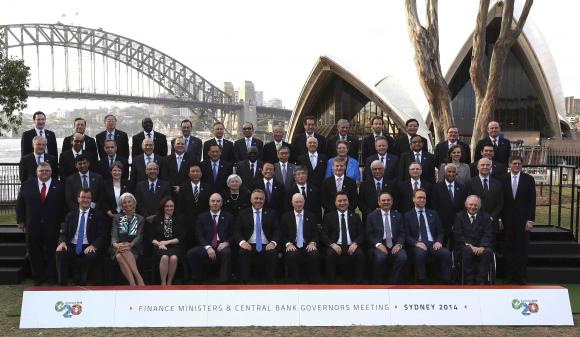The G20 Finance Ministers and Central Bankers (Ministers) met this weekend in Australia to further develop the G20 Brisbane Action Agenda. They released, mercifully, a short communique that identified, whether stated or not, their continued measured efforts to achieve in G20-speak ‘strong sustainable and balanced growth”. This meeting is just one piece in a continuing effort to provide policy coordination for the G20 – and a step along the road to the completion of the Brisbane Action Plan.
I’ll get to the ‘steady stuff’ in a second – not counting of course Canada’s gold medal win in men’s hockey – but first let’s clear away the fluff.
The most evident fluff – paragraph 8 – where the Ministers regretted the failure of the United States Congress to agree to IMF quota reform. As even the Ministers acknowledge this is US domestic politics. While EM countries pushed on this, I am sure, and this is an embarrassment for this Administration – nothing will happen here I suspect till after the 2014 congressional elections. Embarrassing but not useful.
Paragraph 5. and the basic gobbledie gook that countries need to deal with various policy transitions and country circumstances, asset prices and exchange rate adjustment. This principally concerns US Fed tapering and the end of the major asset purchasing. There well may be better communication but even this will be unlikely to solve volatility. And I doubt there will be, if there ever was, the ‘continuation’ of the effort “… to cooperate on managing spillovers to other countries, and to ensure the continued effectiveness of global safety nets.” But the EM countries are concerned over the consequences for their economies of the end of the Fed program.
Paragraph 3. On the positive, but we still need to see the results, is the call by Ministers to raise growth a full 2 percent above the current projected GDP figures (over 5 years). According to the communique:
This is over US$2 trillion more in real terms and will lead to significant additional jobs. To achieve this we will take concrete actions across the G20, including to increase investment, lift employment and participation, enhance trade and promote competition, in addition to macroeconomic policies. These actions will form the basis of our comprehensive growth strategies and the Brisbane Action Plan.
Paragraph 9. Here the Ministers continue to press forward – requiring transparency and sharing data – to reduce BEPS – base erosion and profit shifting – by corporations especially large multinational corporations. As the Ministers identified:
We continue our full support for the G20/OECD BEPS Action Pan, and look forward to progress as set out in the agreed timetable. By the Brisbane summit, we will start to deliver effective, practical and sustainable measures to counter BEPS across all industries, including traditional, digital and digitalised firms, in an increasingly globalised economy. … In parallel, we expect to begin to exchange information automatically on tax matters among the G20 members by the end of 2015.
Paragraphs 10 and 11. These paragraphs underscore the incremental but steady work of much of the G20 – aside from the very public and glitzy, though often disappointing, leaders annual summit. As the Ministers suggested, “In 2014 we are focusing our efforts on substantially completing by the Brisbane summit key aspects of the core reforms we set out in response to the global financial crisis: …” And then the Ministers acknowledged the serious work being undertaken by the IFIs, the OECD and the FSB and other transgovernmental regulatory organizations. This is the real stuff of the G20 and warrants some serious review, by the sceptics – though I suspect none of this will be impressive to this crowd.
Finally, there is Paragraph 7 – providing higher investment, particularly in infrastructure and small and medium enterprises. This is Australia’s new Treasurer Joe Hockey first hosting opportunity. Mr. Hockey, like his boss Prime Minister Tony Abbott, both still seem to be dragged down by the partisan politics of Australia. Both Mr. Hockey and Mr. Abbott are enthusiastic to promote infrastructure, as a means to growth and jobs, but focus apparently on private sector initiatives approaches only.
This seemed to still be evident in the communique’s urging to remove constraints on private investment and the need to emphasize “the role of market incentives and disciplines.” And why was it the the business grouping, the B20 had an infrastructure roundtable with the G20, but no accommodation was made for other outreach groups – the Think20 or C20, L20, etc.
Peculiarly parochial and partisan I’m afraid.


